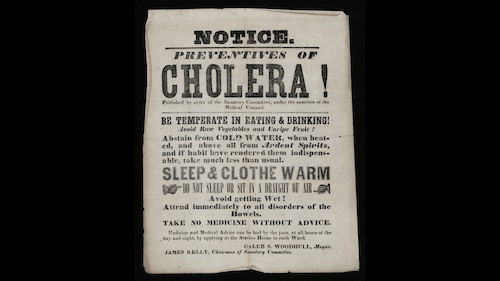Communiqué
Following the use of an essential public health tool for centuries in “Follow the Data” on THE INVISIBLE SHIELD – April 9 at 10 pm
< < Back toTHE INVISIBLE SHIELD
Part Two: Tuesday, April 9, 2024 on PBS and Streaming on PBS.org and the PBS App
Explores the Hidden Public Health Infrastructure in America That Saves Lives Every Day
Episode 2: “Follow the Data” – Tuesday, April 9, 10-11 p.m. (and streaming)
Data has been an essential public health tool since at least the 17th century, when cities began regularly recording mortality statistics. Data science has guided public health policy since the earliest practices of data collection in the 1800s to identify the spread of disease. It continues to be critical to public health workers as they fight the COVID-19 pandemic. But with public health authority delegated to the 50 states, forming a national response to the virus proves difficult.
******
THE INVISIBLE SHIELD, a new documentary series, reveals how the field of public health has saved countless lives in the U.S., protecting people from the constant threat of disease and increasing lifespans. The series explores the hidden public health infrastructure that makes modern life possible. It highlights the thousands of unsung heroes — physicians, nurses, scientists, activists, reformers, engineers, and government officials — who work together to improve health outcomes, from the days of cholera and smallpox through the most recent battle with COVID-19.

Credit:Wikimedia Commons
“The complexity of continued human existence on this planet could never be more challenging. Producing THE INVISIBLE SHIELD series allowed us to appreciate how much we have to thank the dedicated public health sector for tirelessly saving us from ourselves,” said Jon Kamen, Chairman and CEO, RadicalMedia. “The series unpacks just the tip of the iceberg, both historically and to this day, of the importance the role of public health has played in protecting society from the inevitable impact of a constantly increasing population. Producing this series during an unprecedented pandemic, we ourselves discovered and appreciated more than ever, the constant application of science and discipline that this community of individuals and organizations have orchestrated to continue to expand and practice this lifesaving work.”
“Anyone who buckles a seatbelt, eats a meal without trans fats, or works in a smoke-free workplace benefits from public health, even if they don’t realize it,” said Michael R. Bloomberg, founder of Bloomberg LP and Bloomberg Philanthropies, WHO Global Ambassador for Noncommunicable Diseases and Injuries, and 108th mayor of New York City. “Public health policies save and improve millions of lives, but too often, their power is undervalued and misunderstood. This new series shines a much-needed spotlight on public health’s extraordinary successes – and the heroes who make them possible, every day.”
“On the heels of the COVID-19 pandemic, this series presents a candid and pragmatic look at public health, including the challenges and issues of the past that are still relevant and how far we’ve come,” said Sylvia Bugg, Chief Programming Executive and General Manager, General Audience Programming at PBS. “We hope that, as healing is taking place post-pandemic, our audiences will walk away with an even deeper awareness of the function of public health and have greater hope for the future.”
Today most Americans live in a place where the water is safe to drink, and the food is safe to eat. Americans survive many childhood diseases that used to be fatal, and their immune systems are well prepared from a lifetime of standard inoculations. Much of this is taken for granted, but it wasn’t always so.

Credit: National Library of Medicine
“Imagine a world where no vaccines existed, where a third of your children died before reaching adulthood. This was the reality of all human life until just about a hundred years ago,” said Steven Johnson, author of Extra Life and The Ghost Map. “I’ve come to think of public health as a kind of invisible shield that has been quietly protecting us, extending our lives, keeping our children safe.”
Using vivid character portraits, interviews, and archival elements, THE INVISIBLE SHIELD shows that public health is a progressive and revolutionary movement, whose successes have traditionally come from a diverse, cross-disciplinary coalition of dedicated public servants, all working together to improve the conditions of society.
Offering insights from previous pandemics and public health crises — cholera, smallpox, HIV/AIDS, the opioid overdose crisis, and more — the series looks to history to show how public health practices have emerged over centuries as humanity confronted problems arising from urbanization, industrialization, and globalization. It examines public health’s major achievements — including the more than 30-year increase in life expectancy between 1900 and 2000 and the eradication of smallpox in the 1970s. Public health challenges are also explored, including the COVID-19 pandemic, which highlights how misunderstood, undervalued, and underfunded public health is.
Anchored by interviews with impressive frontline leaders and global experts, including those from the Johns Hopkins Bloomberg School of Public Health and other leading public health authorities and institutions, THE INVISIBLE SHIELD documents the field’s dedication and commitment in times of crisis, as well as the preparations needed for future health challenges. It offers expert-backed solutions and makes the case for more data-driven policy and support for the hidden but vital global health infrastructure that works to keep humanity alive every day.

